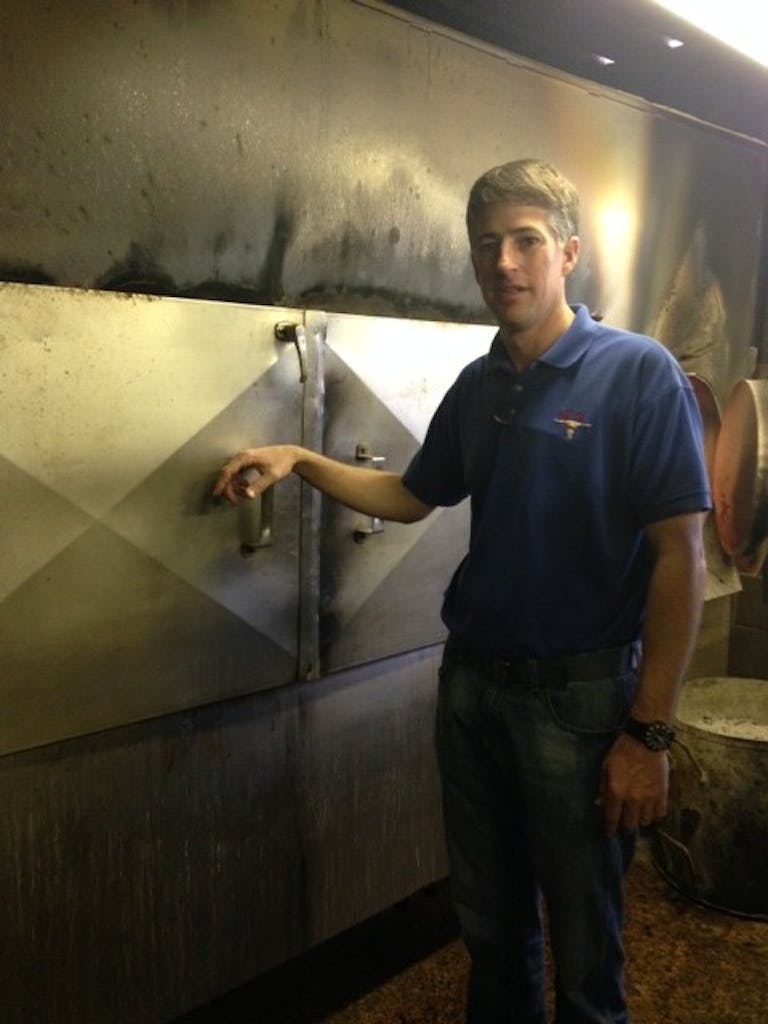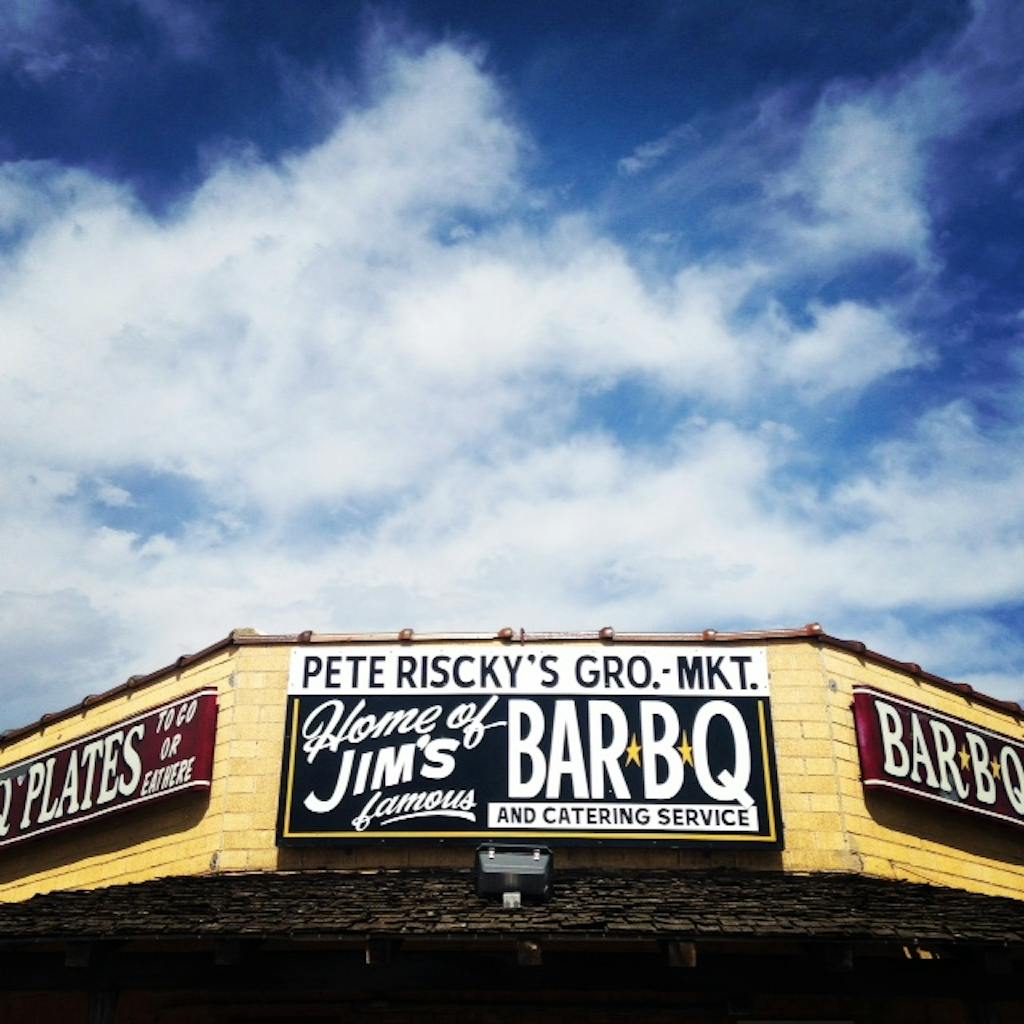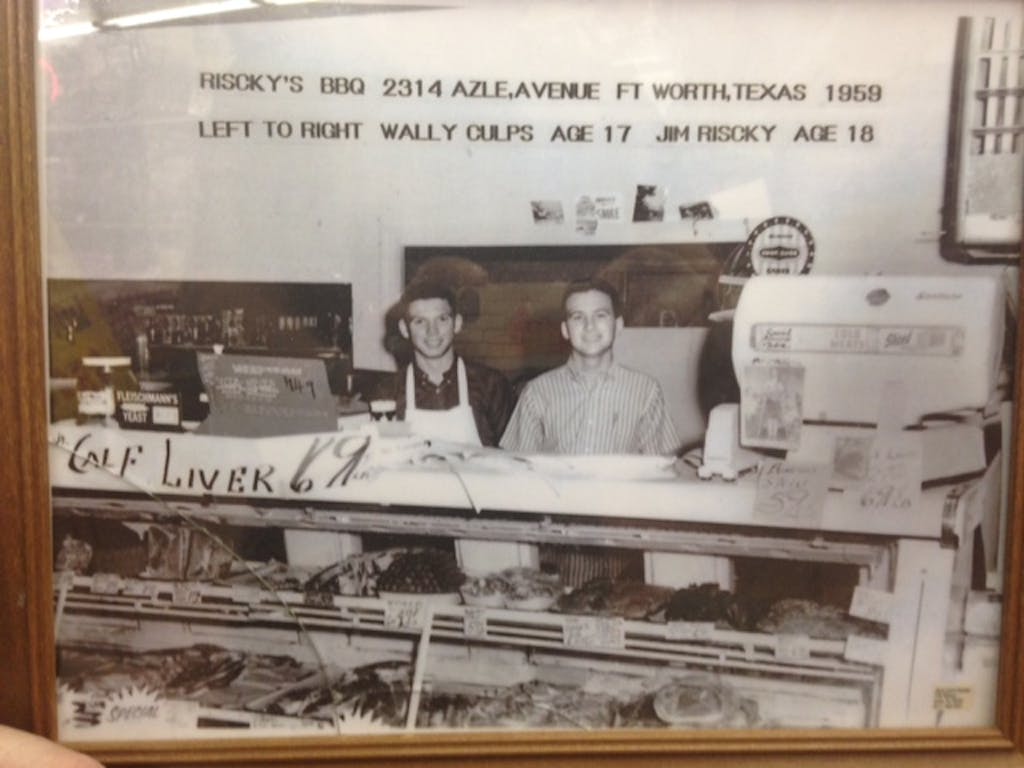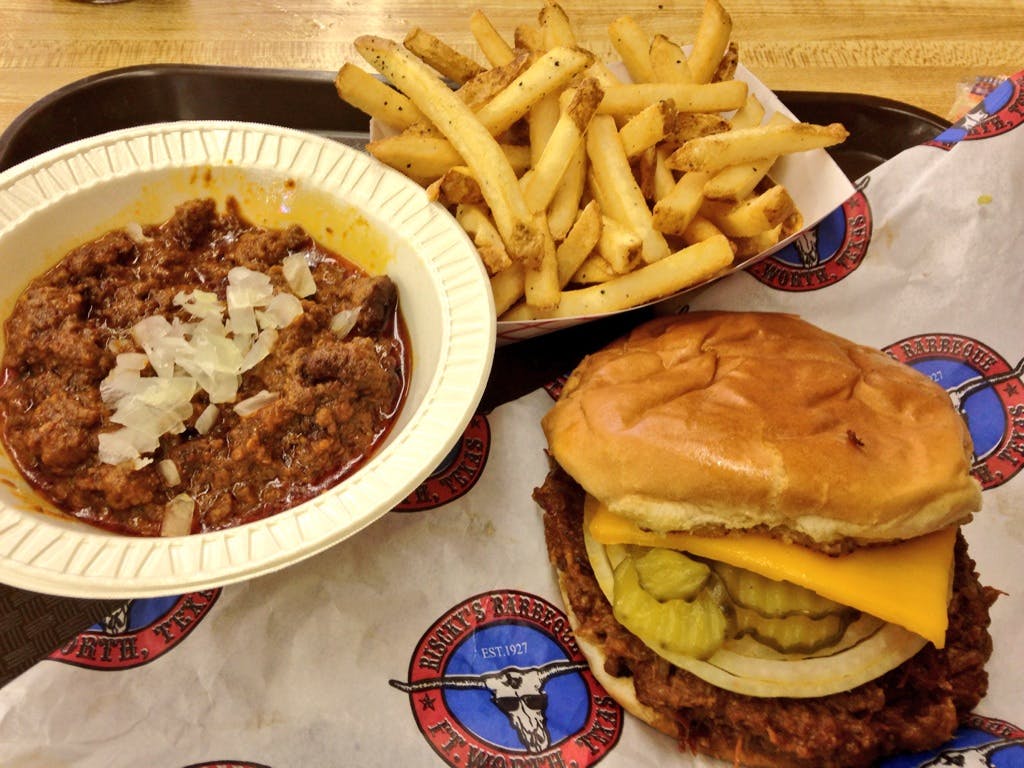How to Cook Riscky's Bbq Beef Ribs
 Pitmaster: Riscky's Barbeque; opened 1927
Pitmaster: Riscky's Barbeque; opened 1927
Age: 38
Smoker:Wood-fired rotisserie smoker
Wood:Post oak
I sat down for lunch at the original location of Riscky's Barbeque on Azle in Fort Worth. It sits just north of the Stockyards in a building from the fifties. Joe Riscky, great grandson to and named after the founder Joe Riscky, gave me a tour and we talked while we walked. When I asked Joe to describe the barbecue here, he said "we're a North Texas barbecue joint. That's a lot different than East or South. We're not like Cooper's either." They're also adaptive. They began with an old sauce recipe that's thin with apple cider vinegar, but they're newer thick, sweet sauce is much more popular with today's customers. They've also went from having chopped beef sandwiches as the most popular menu item to becoming the home of the beef rib. You can get all the beef back ribs you want for under $10 at six locations around Fort Worth, but you'll need to get to the corner of Azle and River Oaks to try the original.
Daniel Vaughn: When was the original Riscky's built?
Joe Riscky: The original location was in the parking lot. It was probably a pre-existing building, but we opened there in 1927. It was Riscky Brothers Grocery. It was a grocery with a meat market in the back. My great great grandmother was the one that did the barbecue. She was Mary [Bunkervitch Riscky] and she was from Poland. The original family was from Poland. They came through Galveston.
DV: What did this area look like back in 1927? Was this outside of town?
JR: No. This was the place to be. Swift was down in the Stockyards. If you go up Jacksboro Highway there were all these houses on the bluff and they were all Swift executives. That's where all the gambling happened too, and the gangsters.
DV: Did any of that gambling happen in the back of this place?
JR: Well, we had one that hung out here. He collected money for Benny Binion back in the day.

DV: The sign out front says Pete Riscky's. Who was Pete?
JR: Pete was my dad's dad. It started with Joe Riscky and his two sons Alex and Pete. There was a third son too, but he died in the war. Alex was more into mechanical stuff. Pete was here and my dad [Jim] came along. My dad would deliver groceries to all the houses. He also did some butcher work. He ran the back half, and my grandfather [Pete] ran the front. Pete sat there all day and tied flies while he ran the register.
DV: How important was the barbecue part of the business then? Was it just a byproduct of the butcher shop?
JR: It was something to do with cheap meat. That was [Jim's] whole mindset. "What is something I can make that's good out of something that's going bad." That's how it all started. Jim is really the one that took it from just being butcher shop with smoked meats to what it is today.
DV: When did they tear down the old grocery store building?
JR: Shortly after this one opened, but it was actually moved out somewhere near Cottondale.

DV: And when was this building built?
JR: This part we're standing in now was the back of the store. It was built in 1954 or '56 [built in 1950 per tax records]. As we walk back toward the pit room we'll cross what was once the alley. Now it's enclosed and it's all one building.
DV: So your dad had to cross the alley to get to the pits?
JR: Yeah. He had to go out the back of the store. The old pits were back here. Growing up I remember my dad getting up in the middle of the night to check the pit. We once had a brick pit that was a rotisserie. My dad built it in the seventies. He got all the fire brick from a guy named Ludwig. Ludwig did all the plasterwork in Fort Worth – the hospital, the football stadium. Anyway, for some reason Ludwig told everybody in town that the bricks came from the incinerator in the mortuary where they burned all the bodies. So my dad ended up building what you see now. It's a steel rotisserie that uses all wood. There's no gas in these. They went in in the late seventies.

DV: Was it just this location back then?
JR: Yes. Then he became partners with a buddy and they started Riscky's To-Go. They bought out a whole bunch of old Chuc-Waguns, which was a little hamburger chain. They cooked everything here and sent them over there to sell chopped beef sandwiches. The whole partnership didn't work out, but dad kept two of them. Then Billy Bob Barnett came along with Billy Bob's. He wanted barbecue, so they opened a little Riscky's To-Go there too. Then dad got the opportunity to do a deal over in Dallas in the West End. It was right across the street from the Palm [at 1701 N. Market St]. When he originally started it he called it Paris, Texas. It had been a French restaurant, so he thought he'd be clever. It didn't do well, so he changed the name to Riscky's Barbeque. That became the first full service Riscky's Barbeque. The quote unquote chain barbecue – boom – started right there. He was cooking here and driving over there a couple times a day. I was a kid so I'd ride with him.
DV: When did the other Fort Worth locations open?
JR: In the early nineties Holt Hickman decides to revitalize the Stockyards. That's when they opened the barbecue joint there. Then Sundance Square comes in. Things were going well. At that same time there was a landlord dispute in Dallas. The guy wanted to put in a laser tag something…long story short my dad said "screw it, I'm going back to Fort Worth." That was about '93 or '94. Then he opened a seafood place called Riscky's Catch, then a Mexican restaurant. They didn't make. We turned the catfish joint into a burger place, and then he leased out Theo's steakhouse which became our steakhouse.
DV: All the barbecue is cooked right here in these cookers?
JR: That's right. We have five of them here. Everything is cooked right here by Roberto and George. Our customers ask us all the time why we never get mentioned along with Angelo's, Railhead, and Cousin's. The reason is that people thing we're just mass producing it. Ninety-five percent of Fort Worth people who have eaten our barbecue have probably not stepped foot in this place. They don't have any idea that this original place exists or how it started. That's kind of our downfall if we want recognition in the barbecue world. But then again, who are you gonna call when you need to feed 10,000 people? This would be a good place to start.
DV: There's also the fact that there aren't many barbecue joints that have been around since 1927.
JR: Right. We're the oldest establishment in Fort Worth, but what are you gonna do?
DV: Does your dad still work here?
JR: My dad is a workaholic. All day long he'd work here then on Sundays he'd cut firewood. That's the kind of life he led. Right now he's over dealing with his car wash across the street. We'll leave him alone today because he's all twisted up.

DV: Do you run the operation then?
JR: I run this location with the pits here. My brother-in-law handles the restaurants. I handle the production. Every day we load the briskets on at 3:00 in the afternoon. We cook two hundred cases of beef ribs every week.
DV: I noticed on the menu that you're one of the few places with a beef rib sandwich.
JR: Well, you just pull the meat off.
DV: Is the beef rib your biggest seller?
JR: It is, because it's all-you-can-eat at the restaurants.
DV: When did they make it onto the menu?
JR: I'm not sure. We started them over in the West End, so probably late eighties.
DV: They make for an impressive looking plate, but there's not much meat there. They must be pretty cheap.
JR: Not anymore. HEB ruined that. Before we were buying Monfort. We called them dinosaur bones but they had just a little bit of meat on them. They were like $0.56 per pound. Cheap. This was in the nineties and early two-thousands. It was throw away meat. Nobody knew what to do with them. They got leaner and leaner as the meat processors starting cutting more meat off. About five years ago we started using these SuKarne ribs out of Mexico. They make a great beef rib.
DV: What do you pay for those today?
JR: About $1.60 per pound. You're probably reading all the hype about beef prices. I called IBP about getting some ground beef, and she told me "Joe, I'd like to sell you some, but I don't have any in inventory." They don't even have any.
DV: So you could not order ground beef from Tyson?
JR: Exactly. No go. They don't have any.
DV: What's the problem?
JR: It's a pissing contest between the rancher and the packer. The ranchers are seeing that corn is down and we've gotten a little rain. Those steers are fattened up, and they ain't got a whole lot in it. They see a lot of profit in that cow, so why not leave it on the hoof until the demand gets so high that they can sell it to the packer and screw them.
DV: You can't blame them after losing so much on last year's cattle.
JR: Heck no. They've been getting killed. The 6666 Ranch moved 1200 head to Wyoming last year, and they don't walk themselves anymore. They're losing, so now it's time to win a little, but the packers ain't having it. They'll just raise the prices so high that you'll go to the store and eat chicken instead. Then they'll tell the ranchers they don't need the cows. The rancher doesn't know what to do, so the packer ends up buying them on the cheap anyway and they're back in business.
DV: So they're just playing poker now?
JR: That's right, and you, me, everybody's caught in the middle.
DV: You're caught even worse because you can't just move your prices up based on what you buy it for.
JR: That's right. I can't sell barbecue for the current market value. My customers would think I was crazy.
DV: But I saw a sign outside your door for five chopped beef sandwiches for $5. How can you do that?
JR: We're not making much on that, but if Armageddon happens maybe somebody will save me because they know that Riscky's fed them.

DV: You also have chili. When did that come about?
JR: In the seventies. We were butchering so we had all this extra meat. We ground it up and made chili. It's made right here too. We also have brisket stew.
DV: That's a good way to use up those leftovers.
JR: Well, not really. Not since the invention of the brisket taco. What used to happen is we'd trim the sliced beef. All those trimming went into a bucket and we'd put it into a buffalo chopper and make chopped beef out of it. Everybody was happy except the health department, so we started holding the trimmings at the right temperature. Anyway, then we started serving the brisket tacos. So we just started chopping the whole point and putting it on a tortilla so there went the trimmings.
DV: Have you always worked here?
JR: No. My cousin and I had a little barbecue place in Fort Worth called Red's. It was down there where the Mexican Inn is on Henderson. A bunch of us went in there and started the place. It was good.
DV: Was that your rebellious streak?
JR: Yeah. A little bit. It worked out. They bought me out before it went kaput. We all learned a lot. All the stuff that my dad had been telling me for years, and I was like "screw you! I ain't sweeping the parking lot." I'd go out there and yell "Somebody better sweep this damn parking lot!" Now I sit in the truck and tell my dad "the older I get, the smarter you get."
DV: Did you come back here to Riscky's after that?
JR: No. I went to school, got in a little trouble, then I went and started cooking steaks at the steakhouse. Then I came here and started doing the buying. I started managing the stores. I was about to get married and I was working seventy hours a week. I decided to go do a few sales jobs, then worked in real estate. I was still giving all I had, so I figured I might as well give all I have to something with my name on it. I started working back year about five years ago. There's a saying in this family. "You better do good in school, or you're going to come home smelling like smoke."
Source: https://www.texasmonthly.com/bbq/interview-joe-riscky-of-risckys-barbeque/
0 Response to "How to Cook Riscky's Bbq Beef Ribs"
Post a Comment